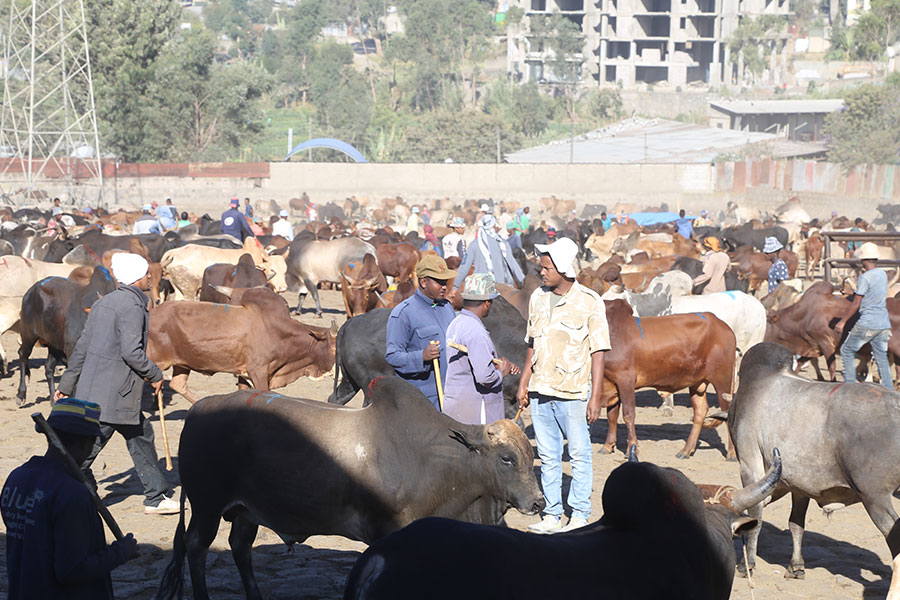
Radar | Apr 10,2021
May 3 , 2025
By Kidist Yidnekachew
There is a little thrill that comes with buying something new, the excitement of having the means, walking out with a bag in hand. That moment can feel validating, even joyful. It is easy to get swept up, purchasing not just what is needed, but whatever catches the eye, smells nice, or simply looks good.
Then comes the flip side. The quiet dread of checking a depleted account or opening an empty wallet. That hollow feeling, sharp, familiar, and hard to ignore.
In a recent interview, Dr. Kumneger, better known as Dr. Zion on TikTok, shared a reminder: life was not meant to be an endless chase. Somewhere along the way, the idea took hold that survival demands a surplus of possessions. But does it?
Scrolling through social media, there was a post where someone questioned why a girl wore the same outfit in multiple videos. Meanwhile, not far from these digital conversations, communities exist where owning even a single change of clothes is a luxury, not for fashion, but for covering oneself. There is a strange kind of freedom in that contrast. A release from the relentless pressure, especially in city life, to curate every detail, to have closets bursting with variety. The love of clothing remains, the exhaustion of constant consumption lingers.
And homes are no different. A house was once a place of shelter, gathering, and rest, with a few essential furnishings. Today, living comfortably seems to require the eye of an interior designer. Each corner must be styled exactly right, and each item photo-worthy. Function has given way to performance.
The mind drifts back to an earlier time in Ethiopia, those years in the ’90s and early 2000s. Simpler, perhaps. During high school graduation season, there were no professional makeup artists or elaborate salon visits. A bit of eyeliner was essential, some eyebrow shaping, and a touch of shadow. Hair was styled, nails maybe painted, but fake lashes and full-face contouring were not part of the ritual. It felt easy. Authentic.
Now, even an ordinary weekend calls for glam squads and studio-level prep. Effort and expense have become everyday expectations. The bar keeps rising, yet the satisfaction often feels further away.
Maybe it is just nostalgia, but those who came of age before the constant glow of smartphones and the infinite scroll of social media knew a different kind of presence. Moments were unfiltered. Lives were less curated. We saw the world with our own eyes, not through a lens engineered for validation.
These days, choosing simplicity feels like an act of resistance. A conscious, daily decision to shift focus from what can be accumulated to what can be nurtured. The pull toward more, more stuff, more style, more content, is relentless.
It is a bit absurd, isn’t it? The way we speak of time as our most precious resource, how we must guard it, and spend it wisely. And yet, we claw out “free time” by stealing it from our children, our partners, our families, only to hand it over to the void: TikTok scrolls, meaningless distractions, and work that never really ends. The people who matter most often get what is left.
Working from home blurs all the lines. It does not always feel like work, but it invades every corner of the day. Sometimes, the desire for quiet is not about peace, it is about reclaiming the phone that has been hijacked by little hands all afternoon. And once the kids are in bed, that reclaimed time gets lost again, to screens, to tasks, to more invisible labour.
But then a stark thought lands: If today was the last day or your last day on earth, would any of this matter? The deliverables? The meetings? The likes? Absolutely not. What matters are the moments soaked in love and laughter, the ordinary rituals that become memories. The people. And yet, look at what often gets prioritised.
No one remembers you for being efficient at emails. But they remember how you made them feel, how present you were, or were not. Being half-there, multitasking, glancing sideways at a screen while nodding at a child’s story, it adds up. Quietly. Tragically.
One video offered a reminder: quality time does not need to be orchestrated. It can exist in the everyday. Letting children join the rhythm of life, folding laundry, washing dishes, and watering plants, turns routine into connection. It transforms guilt into grace.
We have been taught to believe that hustle is the only way forward. And yes, there are seasons of sacrifice. But when achievement costs you the people you claim to live for, it is worth asking who is winning.
Priorities differ. Some chase ambition. Others, stability. Some want wealth. All valid. But if family truly comes first, then the calendar should reflect that truth. Time is the most finite currency, and this world is designed to steal it. The real richness is not in what is owned, but in how that time is spent, and with whom.
PUBLISHED ON
May 03,2025 [ VOL
26 , NO
1305]


Radar | Apr 10,2021

Viewpoints | Jul 24,2021

Commentaries | May 11,2024

Fortune News | Oct 30,2021

Viewpoints | Nov 07,2020

Life Matters | Apr 13, 2025

Radar | Nov 09,2024

Verbatim | Apr 13,2024

Commentaries | Sep 07,2019

Agenda | Jan 06,2019

My Opinion | 131497 Views | Aug 14,2021

My Opinion | 127853 Views | Aug 21,2021

My Opinion | 125831 Views | Sep 10,2021

My Opinion | 123461 Views | Aug 07,2021

Dec 22 , 2024 . By TIZITA SHEWAFERAW
Charged with transforming colossal state-owned enterprises into modern and competitiv...

Aug 18 , 2024 . By AKSAH ITALO
Although predictable Yonas Zerihun's job in the ride-hailing service is not immune to...

Jul 28 , 2024 . By TIZITA SHEWAFERAW
Unhabitual, perhaps too many, Samuel Gebreyohannes, 38, used to occasionally enjoy a couple of beers at breakfast. However, he recently swit...

Jul 13 , 2024 . By AKSAH ITALO
Investors who rely on tractors, trucks, and field vehicles for commuting, transporting commodities, and f...

Jun 28 , 2025
Meseret Damtie, the assertive auditor general, has never been shy about naming names...

Jun 21 , 2025
A well-worn adage says, “Budget is not destiny, but it is direction.” Examining t...

Jun 14 , 2025
Yet again, the Horn of Africa is bracing for trouble. A region already frayed by wars...

Jun 7 , 2025
Few promises shine brighter in Addis Abeba than the pledge of a roof for every family...

Jun 29 , 2025
Addis Abeba's first rains have coincided with a sweeping rise in private school tuition, prompting the city's education...

Jun 29 , 2025 . By BEZAWIT HULUAGER
Central Bank Governor Mamo Mihretu claimed a bold reconfiguration of monetary policy...

Jun 29 , 2025 . By BEZAWIT HULUAGER
The federal government is betting on a sweeping overhaul of the driver licensing regi...

Jun 29 , 2025 . By NAHOM AYELE
Gadaa Bank has listed 1.2 million shares on the Ethiopian Securities Exchange (ESX),...